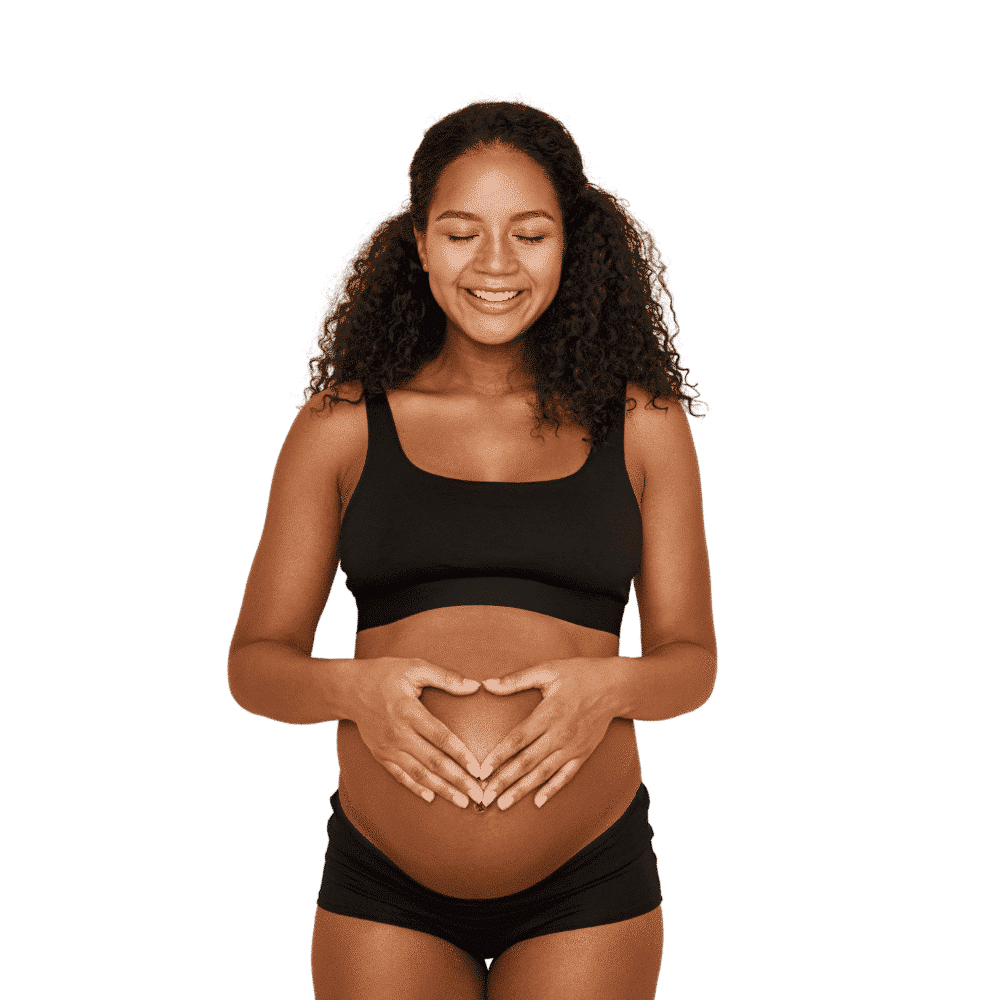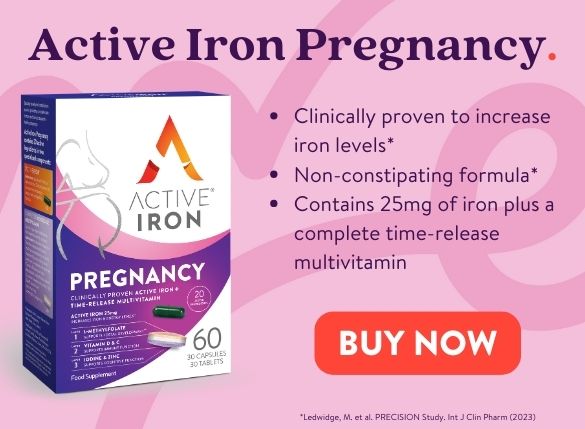
- Iron supplements for pregnant women
- Best iron supplement for pregnancy: Active Iron
- Can you take iron tablets while pregnant?
- Postpartum iron supplements
- Iron rich foods for pregnancy
- Postpartum/postnatal vitamins: what you need to know
- Iron tablets in pregnancy: when to start
- Iron dose in pregnancy
- Prenatal iron supplements
Iron is an essential micronutrient. Our body needs it to function normally. It is used in the production of red blood cells, cell growth and division, making sure each cell in the body gets enough oxygen and many other vital processes.
Women on average need twice as much daily iron however this need for iron grows exponentially during pregnancy – as much as 2-3 times.
As I will detail later, getting enough iron from food sources alone can be tough and that’s why understanding the prenatal stage also known as antenatal (during pregnancy) in some cases iron supplements gives you the knowledge to make the right decisions to enable you to have a healthy pregnancy.
Why prenatal/antenatal women need iron
During pregnancy, the amount of blood in a woman’s body doubles in volume. This is to ensure that the mother can provide herself and her growing baby with all that they both need during the 40 weeks of pregnancy.
A vital micronutrient fundamentally involved in all of this is iron. Iron is not made by the body but rather we must get it through our food or through supplements, to ensure we have enough.
Iron is used in our blood and also to a lesser extent stored in the muscles and liver (ferritin levels) but more of that later.
As the amazing human body adapts and grows through the 1st then the 2nd and 3rd trimester, the need for iron is ever increased.
If the amount of iron being taken in the diet is not enough, the body will 1st use up the iron stores and then progressively become more depleted.
Once depleted, diet alone will never be enough to give the body and bay all the iron it needs. If the mother is low in iron, there is very good chance the baby will be to and there are long term health implications not lest increased risk of pre-term birth, low birth weight and cognitive issues.
How much iron do prenatal women need?
It is recommended that pregnant women need about 27 to 30 mg every day. However, if they have a history of inadequate iron or are in an at-risk group, for example, are under 20, have multiple births, have had babies close together, are on a restricted diet such as vegetarian or have any absorption issues such as IBS, then they will require more.
The WHO recommends 60mg for pregnant women at risk of inadequate iron.
If you are struggling with your iron levels heading into pregnancy, you can be guaranteed your iron will be significantly lower in pregnancy. The lower the iron, the harder it is to fix. So that’s why ensuring you have a diet rich in iron before and during pregnancy is vital.
How to ensure you have an iron-rich diet pre-pregnancy
Ensuring you have a diet rich in iron before you get pregnant or while planning a pregnancy is a really good idea.
Having a well-balanced diet rich in iron-rich foods from a variety of sources means that you are laying the foundation for having a good diet prenatally/antenatally. Iron comes from 2 different sources heme iron and non-heme iron.
Simply put, heme sources are animal based, and non-heme are plant-based. Heme iron is better and more easily absorbed by the body, whereas non-heme iron is less absorbable. Please find the below list as a guide:
List of iron rich foods for prenatal women
Heme sources of iron:
- Beef
- Lamb
- Chicken
- Turkey
- Pork
- Ham
- Veal
- Fish
- Eggs
Nonheme Sources of Iron:
- Green leafy vegetables(Spinach{cooked}, broccoli, chard, kale, cabbage)
- Potatoes (skin on)
- Sweet potatoes
- Legumes (lentils, soy beans, green beans, black eyes peas)
- Beans (chickpeas, kidney beans, white beans)
- Fortified cereals
- Fortified rice and pasta
- Canned or stewed tomatoes
- Beets
- Dried apricots or peaches
- Figs
- Raisins
- Pumpkin seeds
- Pistachio nuts
- Cashew nuts
- Oats (Porridge)
- Branflakes
How to compliment an iron rich diet pre-pregnancy
There are some things in the diet that can make iron more difficult to absorb such as plant phenols and too much tea and coffee.
Some tablets might also affect absorption – talk to your health care professional or pharmacist if you are concerned.
Foods higher in vitamin C can help make more non heme iron ingested, available for absorption. Good sources of Vit C include citrus fruits, red or yellow peppers or a good quality supplement.
Should I take a prenatal supplement with iron?
The simple answer is yes. Why? Because Iron is so important, you may be unaware your levels are inadequate before you are pregnant, the needs are so great in pregnancy and the difficulties of getting in enough iron sources in your diet.
Taking a good quality iron supplement in pregnancy is a great way to help you and your baby stay healthy and well.
However, it is important to note that not all iron supplements are created equally. Choosing a supplement that is clinically proven, recommended by healthcare professionals and specially formulated to be both kinds are strong is so important. That’s why Active Iron is the only supplement I recommend as a midwife.
Gentle and easily absorbed prenatal iron supplements
Many people are reluctant to take supplements and particularly iron supplements, due to the side effects.
Active Iron is created differently. It has a patented formula of iron biospheres wrapped in a whey shell means it isn’t broken down higher up in the stomach (like most other supplements) but rather lower down in the stomach, meaning it doesn’t cause constipation like other tablets.
In fact, clinical studies have shown it is 2X better absorbed and 6X less likely to cause gut irritation as well as improving iron levels by an amazing 94%.
Can I take an iron supplement like Active Iron with my current prenatal vitamins?
Active Iron can be purchased as a stand-alone product or as part of Active Iron Pregnancy, which includes a complete time-release multivitamin that provides all the key nutrients for mum and baby.
Active Iron Pregnancy provides the essential nutrients mum and baby need throughout each trimester.
It really is the most complete nutritional supplement. However, you can just take the iron supplement alongside your traditional pregnancy multivitamin if you would prefer.
Conclusion: prenatal iron supplements
Iron is essential for life. It is the most common nutritional deficiency in the world. Many people may have inadequate iron levels but might not have any idea before they get pregnant.
Iron requirements at least double during pregnancy so making sure you have an iron rich diet and taking a good quality supplement are simple but effective ways of helping yourself have a healthy pregnancy and a healthy baby.
Active Iron can be taken by itself, alongside other multivitamins but Active Iron Pregnancy plus is the complete nutritional solution for your pregnancy needs.
Further reading:
LINK Active Iron- Iron Rich foods in Pregnancy
LINK Active Iron-When to start Iron


